
In Transit: Gangs and Criminal Networks in Guyana (Working Paper 11)
Since 2000, Guyana has seen a rise in violent crime associated with gangs and organized crime syndicates, which have created drug and weapon problems in the country. Cocaine, trafficked from neighbouring Venezuela, is transited through Guyana en route to Europe and the United States. Gangs also utilize the country’s porous borders with Brazil, a major weapons manufacturer, to smuggle arms into Guyana and ship them to other countries in the Caribbean.
While one of the least developed countries in the Caribbean region, Guyana’s problems with armed violence are not as severe as many of its neighbours. In 2009 Guyana’s homicide rate was 15 deaths per 100,000, while Jamaica, for example, had a homicide rate of 62 deaths per 100,000. However, left unchecked Guyana’s situation has the potential to continue to worsen.
In Transit: Gangs and Criminal Networks in Guyana examines the nature of Guyanese gangs and criminal networks and sheds light on some of their activities.
The report gives a brief history of gang violence in Guyana, examining the political and criminal nature of the gangs, and reviews the theoretical approaches that seek to explain gang violence in the Caribbean, analysing their relevance to the Guyanese context. It considers the three types of gangs in Guyana—local gangs, the ‘Five for Freedom’ and the phantoms, and large-scale gangs—and their activities.
The report also explores how corruption and insufficient institutional capacity in the country’s security sector sustain gang activity, and assesses the Guyanese government’s policy response to the issues of domestic gang violence as well as international donor-driven initiatives.
Available in ENGLISH